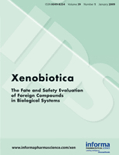
XENOBIOTICA
Scope & Guideline
Advancing the Science of Xenobiotics.
Introduction
Aims and Scopes
- Pharmacokinetic Studies:
The journal publishes research on the absorption, distribution, metabolism, and excretion (ADME) of drugs and other xenobiotics, highlighting methodologies to investigate these processes in various biological systems. - Drug Metabolism and Toxicology:
A significant focus is placed on the metabolic pathways of drugs, including the role of cytochrome P450 enzymes and other metabolic processes, as well as the associated toxicity and safety profiles. - Predictive Modeling and Simulation:
XENOBIOTICA supports the use of in silico and physiologically based pharmacokinetic (PBPK) modeling to predict human pharmacokinetics and drug-drug interactions, thereby facilitating more effective drug development. - Comparative Metabolism:
The journal explores species differences in drug metabolism, providing insights into the relevance of animal models in predicting human outcomes, which is critical for regulatory submissions. - Biotransformation Workshops and Reports:
The journal includes meeting reports and special editions related to biotransformation workshops, fostering collaboration and dissemination of cutting-edge research in drug metabolism.
Trending and Emerging
- Machine Learning and AI in Drug Development:
Recent publications have increasingly focused on the application of machine learning and artificial intelligence for predicting ADME properties and drug interactions, showcasing the potential for these technologies to enhance efficiency in drug development. - Precision Medicine and Pharmacogenomics:
There is a growing emphasis on studies that examine genetic polymorphisms and their impact on drug metabolism and pharmacokinetics, aligning with the broader trend towards personalized medicine. - Advanced Drug Delivery Systems:
Research on novel drug formulations and delivery methods, particularly those that enhance bioavailability and patient compliance, is on the rise, indicating a shift towards practical applications in clinical settings. - Integration of In Vitro and In Vivo Models:
An emerging trend is the integration of in vitro and in vivo studies to provide more comprehensive insights into drug metabolism and pharmacokinetics, reflecting a desire for more translational research that can inform clinical practices.
Declining or Waning
- Traditional Toxicology Studies:
There has been a decrease in the publication of traditional toxicology studies that do not leverage modern methodologies or predictive modeling, as the field moves towards more integrated and innovative approaches. - Non-Pharmacokinetic Studies:
Papers focusing on non-pharmacokinetic aspects of drug action, such as purely pharmacodynamic studies without a pharmacokinetic context, are becoming less common, indicating a shift towards more comprehensive studies that integrate both aspects. - Basic In Vitro Studies:
The journal has seen a decline in basic in vitro studies that do not contribute new insights into drug mechanisms or metabolism. The emphasis is now on more complex models that better simulate in vivo conditions.
Similar Journals

AAPS Journal
Shaping the Future of Pharmaceutical Research and Applications.AAPS Journal, published by Springer in the United States, is a leading peer-reviewed journal dedicated to the advancement of research in the field of Pharmaceutical Sciences. With an impressive Q1 rank in its category and a position within the 81st percentile of Scopus rankings, it serves as a vital resource for researchers and professionals seeking to disseminate impactful findings and innovative methodologies. The journal publishes high-quality original research, review articles, and technical reports aimed at addressing the multifaceted challenges in pharmacology, toxicology, and pharmaceutics. Operating under an Open Access model, AAPS Journal ensures broad dissemination of knowledge, contributing to the enhanced visibility and accessibility of research outputs. With a publication window spanning from 1999 to 2024, it continues to shape the future of pharmaceutical research and its applications. Researchers, students, and industry professionals will find a valuable repository of cutting-edge knowledge in this esteemed journal.

Clinical Pharmacology in Drug Development
Transforming clinical practices with groundbreaking research.Clinical Pharmacology in Drug Development, published by WILEY, is a distinguished journal dedicated to advancing the field of pharmaceutical science and drug development. With a strong commitment to disseminating cutting-edge research, this journal serves as a crucial platform for professionals, researchers, and students aiming to enhance their understanding of pharmacological principles and innovations in medical therapeutics. Since its inception in 2012, the journal has consistently maintained a noteworthy presence in the academic community, currently achieving a Q2 ranking in both Pharmaceutical Science and Medical Pharmacology categories as of 2023. Although the journal operates under a subscription model, it is highly regarded for its rigorous peer-reviewed publications, offering insights into drug efficacy, safety, and regulatory challenges. Positioned at the intersection of clinical practices and pharmaceutical advancements, Clinical Pharmacology in Drug Development plays an essential role in bridging the gap between scientific research and real-world application, ensuring that the latest therapeutic strategies are optimized for patient care.
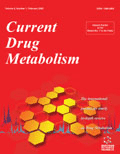
CURRENT DRUG METABOLISM
Shaping the Future of Drug Development and SafetyCURRENT DRUG METABOLISM, published by Bentham Science Publishers Ltd, serves as a pivotal resource in the fields of Clinical Biochemistry and Pharmacology. With an ISSN of 1389-2002 and an E-ISSN of 1875-5453, this journal has carved a niche since its inception in 2000, offering in-depth research and reviews that bridge the gap between drug metabolism and its clinical applications. The journal finds itself positioned in the third quartile (Q3) for both Clinical Biochemistry and Pharmacology as of 2023, reflecting its significance within these scientific sectors, with Scopus rankings showcasing its role in advancing knowledge—rank #167 in Pharmacology and #66 in Clinical Biochemistry. Researchers and industry professionals are encouraged to contribute their findings, fostering a diverse platform that informs and inspires innovations in drug development and safety. While CURRENT DRUG METABOLISM operates under a traditional subscription model without open access, its rigorous peer-review process ensures the quality and integrity of the published work, making it indispensable for anyone engaged in drug research and biochemistry.
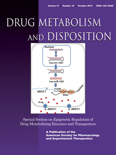
DRUG METABOLISM AND DISPOSITION
Pioneering Discoveries in Pharmacological ScienceDrug Metabolism and Disposition is a premier journal published by the American Society for Pharmacology and Experimental Therapeutics, focusing on crucial advancements in the fields of pharmaceutical sciences and pharmacology. Since its inception in 1973, this esteemed journal has established itself as a leading platform for innovative research, earning a prestigious Q1 rating in both Pharmaceutical Science and Pharmacology categories as of 2023. With an impressive Scopus ranking of #52 out of 183 in Pharmaceutical Science and #105 out of 313 in Pharmacology, it occupies a vital place in an increasingly competitive academic landscape. Researchers, professionals, and students alike benefit from its rigorous peer-reviewed articles that delve into drug metabolism processes and their physiological implications, making it an indispensable resource for anyone aiming to advance their understanding of drug disposition and efficacy. This crucial journal contributes significantly to the ongoing dialogue in pharmacology and toxicology, providing insights that help shape future therapeutic strategies and regulatory policies.
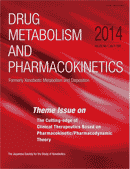
Drug Metabolism and Pharmacokinetics
Transforming Pharmacological Knowledge into PracticeDrug Metabolism and Pharmacokinetics is a premier academic journal committed to advancing the understanding of drug metabolism processes and pharmacokinetic principles critical to the development of therapeutics. Published by the Japanese Society for the Study of Xenobiotics, this journal has established itself as a vital resource within Pharmaceutical Science and Pharmacology, achieving a respectable Q2 ranking in the latest 2023 metrics. Spanning from 2002 to 2024, the journal publishes original research articles, reviews, and insights that address contemporary issues in xenobiotic metabolism and pharmacologic practices. With its ISSN of 1347-4367 and E-ISSN of 1880-0920, Drug Metabolism and Pharmacokinetics is indexed in leading databases, enhancing its visibility and accessibility for researchers, professionals, and students alike. By fostering a rigorous scientific dialogue, the journal plays an essential role in shaping the future of pharmacology and pharmaceutical sciences.
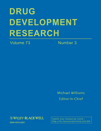
DRUG DEVELOPMENT RESEARCH
Illuminating the path to novel therapeutics and safety assessments.DRUG DEVELOPMENT RESEARCH is a premier interdisciplinary journal published by Wiley, focusing on the latest advancements in drug discovery, pharmacology, and toxicology. With an ISSN of 0272-4391 and an E-ISSN of 1098-2299, this esteemed publication has been a cornerstone in the field since its inception in 1981 and continues to provide cutting-edge research until 2024. Its rigorous peer-review process and strategic placement in Q2 of the Drug Discovery category, as well as ranking #60 out of 157 in Scopus, underscore the journal's relevance and influence, boasting a respectable 62nd percentile ranking. While the journal does not currently offer open access, it remains a vital resource for researchers, professionals, and students seeking to expand their knowledge on the processes of drug development, identifying new therapeutic targets, and assessing the efficacy and safety of novel compounds. Situated in Hoboken, NJ, this journal stands at the forefront of pharmaceutical innovation, making significant contributions to the advancement of medical science.

BMC Pharmacology & Toxicology
Pioneering research for a safer, healthier world.Welcome to BMC Pharmacology & Toxicology, a premier open-access journal dedicated to advancing the fields of pharmacology and toxicology. Published by BMC since 2012, this esteemed journal offers a platform for researchers, professionals, and students to disseminate cutting-edge research and innovative findings that explore the intricate interactions between drugs and biological systems. With its robust Q2 ranking in both general medicine and pharmacology categories for 2023, BMC Pharmacology & Toxicology is recognized for its significant contributions to the academic community, reflected in its strategic positioning within the 61st and 49th percentiles in Scopus rankings for related disciplines. The journal's commitment to open access ensures that vital research is accessible to a global audience, fostering collaboration and informed discussions. We invite you to engage with the latest studies, reviews, and innovative methodologies that shape the future of pharmacological and toxicological sciences.
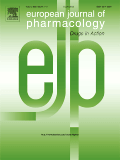
European Journal of Pharmacology
Exploring the frontiers of therapeutic applications and drug development.The European Journal of Pharmacology, a prestigious publication by Elsevier, serves as a vital resource in the field of pharmacology, offering rich insights into drug development and therapeutic applications. Since its inception in 1967, this journal has evolved to encompass groundbreaking research, including pharmacokinetics, toxicology, and innovative pharmacological methodologies, making it an essential platform for researchers and professionals alike. With an impressive impact factor that places it in the Q1 category of pharmacological journals and a Scopus ranking of #49 out of 313, the journal is recognized in the 84th percentile within its category, solidifying its significance in the academic community. Although the journal is not open access, it continues to attract contributions from leading scientists worldwide, ensuring that cutting-edge findings are disseminated effectively. The European Journal of Pharmacology not only highlights advancements in drug discovery and clinical applications but also promotes interdisciplinary collaboration, ultimately contributing to the progress of healthcare globally.

International Journal of Pharmacology
Bridging Research and Application in PharmacologyWelcome to the International Journal of Pharmacology, a key publication in the field of pharmacology, published by ASIAN NETWORK SCIENTIFIC INFORMATION (ANSINET). Since its inception in 2006, this journal has provided a vital platform for researchers and professionals to disseminate their findings and insights in pharmacology, toxicology, and pharmaceutics. Despite recent discontinuation in Scopus coverage, the journal's dedication to fostering scientific dialogue continues to attract contributions from esteemed scholars globally. With an **ISSN of 1811-7775** and **E-ISSN of 1812-5700**, the journal seeks to bridge the gap between laboratory research and clinical application, promoting a deeper understanding of drug actions and interactions. Although it operates under traditional access options, the relevance of its published studies to ongoing pharmacological research remains significant.
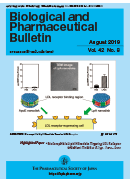
BIOLOGICAL & PHARMACEUTICAL BULLETIN
Fostering Excellence in Biomedical and Pharmaceutical DiscourseBIOLOGICAL & PHARMACEUTICAL BULLETIN, published by the PHARMACEUTICAL SOC JAPAN, is a prominent peer-reviewed journal that serves the fields of medicine, pharmaceutical science, and pharmacology. With an ISSN of 0918-6158 and an E-ISSN of 1347-5215, this publication has been crucial in disseminating innovative research since its inception in 1993, and it continues to contribute significantly to the body of knowledge as it converges towards 2024. Despite being classified as a non-open access journal, it maintains a respectable Q3 ranking in Medicine (miscellaneous) and Q2 in Pharmaceutical Science, highlighting its critical role in advancing scientific discourse in these areas. With Scopus rankings placing it in the 51st percentile for Pharmaceutical Science and 38th percentile for Pharmacology, BIOLOGICAL & PHARMACEUTICAL BULLETIN is an essential resource for researchers, professionals, and students looking to stay abreast of cutting-edge developments and trends in biomedicine and drug development.